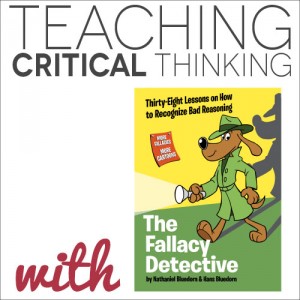 One of the most accessible basic logic books on our book shelf is The Fallacy Detective: Thirty-Eight Lessons on How to Recognize Bad Reasoning (affiliate link) by Nathan and Hans Bluedorn. The book helps kids (and adults) spot errors in thinking -- logical fallacies often used in an effort to persuade others. Learning about fallacious thinking is valuable for academic reasons, but it's also important to being a good consumer (recognizing how advertising works) and to being a good citizen (understanding how political communication works).
One of the most accessible basic logic books on our book shelf is The Fallacy Detective: Thirty-Eight Lessons on How to Recognize Bad Reasoning (affiliate link) by Nathan and Hans Bluedorn. The book helps kids (and adults) spot errors in thinking -- logical fallacies often used in an effort to persuade others. Learning about fallacious thinking is valuable for academic reasons, but it's also important to being a good consumer (recognizing how advertising works) and to being a good citizen (understanding how political communication works).
Teaching Critical Thinking
You could take the book's 38 lessons and use them once-a-week in a year-long study of logic, but we've never been able to. Each time I've gotten the book out for a kid, he's pretty much gone straight through it. We've used the book to help the boys learn critical thinking, instead of curriculum.
The book explains fallacies such as ad hominem attacks (such as name calling -- attacking the person), straw man arguments, slippery slope arguments, and false analogies.
After each of my children read the book, we had ongoing dialogue about fallacies they detected in all kinds of communication -- television commercials, political speeches, websites, and online forums. This makes a great preparation for college, since many college assignments will require students to analyze the evidence for or against certain issues.
In fact, when I have taught public speaking at the college level, one of the things I always end up doing is teaching about fallacies, to help students avoid basing their speeches on faulty reasoning. The students who have previous experience with identifying fallacies always have a head start.
The Fallacy Detective is ideal for 6th - 9th grade, depending on the maturity of the reader. If you have a child who is into debate, Model United Nations, or public speaking, the book will be especially valuable. It's also a great companion for kids learning about writing critical or persuasive essays, so it would work well as part of an emphasis on non-fiction composition.
The book can be used on an individual basis or for co-op classes. Group classes, in particular, might enjoy combining The Fallacy Detective with a study of current events.
One caveat about the book -- it is written from a specific Christian world view. I think the book is useful even if you don't agree with all the religious aspects -- and an astute parent can even incorporate discussion about the book's basic world view into the discussion of fallacies. That's a bit meta -- but many kids will find that to be an interesting discussion -- one that even foreshadows graduate school, where understanding writers' underlying views can be primary.
Learn more about the book and related materials from the website for The Fallacy Detective.



 A popular speaker at homeschooling conferences, business groups, and parents’ groups, Jeanne Potts Faulconer homeschooled her three sons in North Carolina, Mississippi, and Virginia for twenty years. Holding her Master of Arts degree in Communication, Jeanne conducted portfolio evaluations for Virginia homeschoolers for evidence of progress for many years. Jeanne is a former college faculty member, former editor for several publications, news correspondent for WCVE, and former director of Brave Learner Home. She is the contributing editor for TheHomeSchoolMom newsletter and writes the popular Ask Jeanne column addressing homeschool parents' questions here at TheHomeSchoolMom.
A popular speaker at homeschooling conferences, business groups, and parents’ groups, Jeanne Potts Faulconer homeschooled her three sons in North Carolina, Mississippi, and Virginia for twenty years. Holding her Master of Arts degree in Communication, Jeanne conducted portfolio evaluations for Virginia homeschoolers for evidence of progress for many years. Jeanne is a former college faculty member, former editor for several publications, news correspondent for WCVE, and former director of Brave Learner Home. She is the contributing editor for TheHomeSchoolMom newsletter and writes the popular Ask Jeanne column addressing homeschool parents' questions here at TheHomeSchoolMom.
Leave a Reply